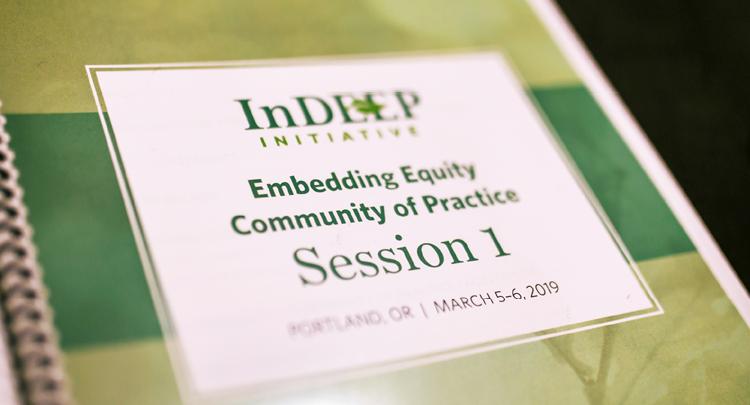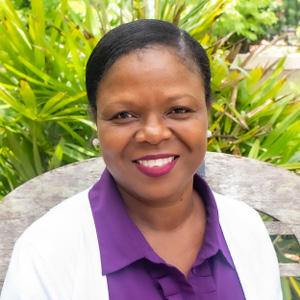InDEEP Initiative Combines Environmental Impact With Racial Equity in Philanthropy


At a recent gathering of the Embedding Equity Community of Practice (EECoP), a program of the InDEEP Initiative, Matt Wisniewski, senior program officer at the S.D. Bechtel Jr. Foundation, mused that one of the reasons racial equity was important to him was that he wanted to be part of “something big and beautiful.”
The comment seemed to resonate with the other attendees, who agreed that they wanted to be part of something bigger than themselves, to feel like they were making a difference. It’s likely why many of them got into environmental philanthropy in the first place, and it certainly drew them to be part of a community of practice that focuses on learning and sharing best practices for promoting racial equity within a sector that has historically been white-dominated.
InDEEP stands for Inclusion, Diversity, and Equity in Environmental Philanthropy, and it was launched in 2017 under the auspices of my organization, Keecha Harris and Associates, Inc. of Birmingham, Ala.
Today, it is a professional development series that engages a network of foundation staff, including senior leaders, who are committed to integrating racial equity and social justice throughout their environmental philanthropy. InDEEP’s goal is for grantmakers to cultivate opportunities to increase funding for organizations led by people of color, to embed a justice and equity lens into their grantmaking, and to strengthen the capacity of grantee organizations and leaders across the field to create a more diverse and inclusive environmental movement.
“It is imperative that funders working to bring about environmental stability and resilience do so with an explicit racial equity lens and vocabulary.”
The impetus behind the InDEEP Initiative was the much-publicized 2014 report by Dr. Dorceta Taylor, The State of Diversity in Environmental Organizations: Mainstream NGOs, Foundations, Government Agencies. The report confirmed what many environmental funders already knew to be true: their slice of the philanthropic sector, like the field as a whole, was overwhelmingly composed of white leaders and staff. What’s more, their funding streams went to mostly white-led NGOs.
An equally damning follow-up report in 2018 showed that the percentage of environmental organizations reporting their diversity data on GuideStar had been declining steadily since 2014. The slump in reporting emphasized the overall dearth of racial diversity in environmental grantmaking.
Galvanized by the data, our organization hosted a one-day Peer Learning Exchange (PLE) in January 2017, coupled with a People of Color Convening. We brought together 30 environmental funders from 22 environmental foundations to begin a conversation. In the ensuing (nearly) three years, InDEEP has reached nearly 400 leaders and staff at 129 foundations.
During the first gathering of what would become InDEEP, one participant noted; “I have been eager to find a safe place to learn, explore, and be challenged in the DEI (diversity, equity, and inclusion)/environmental philanthropy space, and InDEEP is serving to be just that.”
The community of practice now convenes twice a year, giving participants the tools and strategies to go deep on the issue of racial equity, and the safe space with peers and colleagues to engage in Courageous Conversations™ (a facilitation protocol for engaging in interracial dialogue). A recent cohort participant said: “InDEEP has helped to normalize conversations about race in environmental philanthropy.”
As a result of the InDEEP work, the Presidents’ Forum was launched as a series of gatherings that are exclusive to foundation presidents and CEOs.
In the summer of 2018, interviews with 13 investors and partners informed an evaluation of InDEEP’s first two years. Interviewees shared the aspects of this program that they found most valuable to informing how they or their foundation think about, approach, or support racial equity in their grantmaking. Answers included:
Additionally, a 198-person email survey was fielded in fall 2018. Survey respondents were asked to select the top three benefits of InDEEP participation. People with both high and low levels of participation selected “new professional contacts related to race, inclusion, and diversity” as the top benefit of participation (70.0% and 64.3%, respectively).
There was one notable difference between the groups: high-level InDEEP participants (i.e., those who engaged most deeply with the program and its content) indicated more active engagement with organizational DEI initiatives, while low-level InDEEP participants indicated that they gained confidence in raising issues within the sector.
A baseline survey of participants helped us identify areas of strength and areas for growth. Respondents rated their personal and organizational use of a racial equity lens on a scale of 1–10, with 10 being the highest score and 1 being the lowest. When evaluating their own knowledge, overall, the highest rating for “personal knowledge” was in participants’ understanding of the origins of racial inequities (6.4 out of 10), and the lowest rating was in their understanding of how to use data effectively (4.7 out of 10).
Respondents’ highest “organizational” rating was in response to DEI being important to effective organizational leadership (6.7 out of 10). The lowest rating was in response to their organizations’ investments showing a reduction in racial (3.3 out of 10) and income disparities (3.0 out of 10).
Survey respondents reported organizational changes in practices, procedures, programs, and policies during their engagement with InDEEP. Internal changes were reflected in both staff and leadership levels. Organizations used internal and external surveys of staff, membership, grantees, and programs to inform their targeted areas for change, in addition to analyzing data collected in meeting discussions and retreats.
For 2019, the InDEEP Initiative has focused much of its programming on working with the Embedding Equity Community of Practice (EECoP). While we continue to offer other learning opportunities to the field such as webinars, one-day DEI intensives, online engagement through our equity truthteller series, and the ongoing evaluation of the initiative, the EECoP has honed its in-person offerings to create an experience wherein participants are engaged for two years on a deep level of personal, professional, and organizational exploration relative to diversity, racial equity, and inclusion.
The EECoP meets during the first two quarters of the year (typically March and May) to avoid conflicting with dates for other environmental funder conferences and affinity group meetings in the summer, fall, and winter months. Topics for these sessions include Courageous Conversations™ on race, race and power, resilience and triggers, sources of power, tackling implicit bias, and white fragility.
The overarching objectives for the sessions are:
Ongoing post-meeting evaluations show that participants feel more confident in their ability to have Courageous Conversations™ on race and have a better understanding of intersectional identities and their relative impacts.
Since the two-year commitment may not be feasible for everyone interested in the issue, InDEEP began offering one-day intensive sessions (typically held the day before and in the same location as an EECoP convening) for any environmental grantmaker who wants to participate in a racial equity primer session. The next DEI session is scheduled for March 3, 2020, in Montgomery, Alabama; the May date is pending.
Additionally, InDEEP hosts webinars that are exclusive to the EECoP members as well as webinars for funders at large. The schedule for the InDEEP 2020 Webinar series is available at this link.
We may not be able to reach everyone in the environmental sector, and the work is sometimes messy, but we are confident that we are creating something big and beautiful, and we are inviting in anyone who wants to be a part of it.
